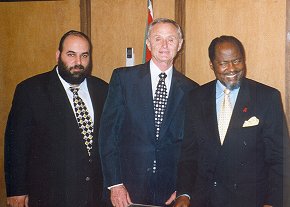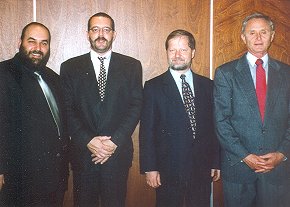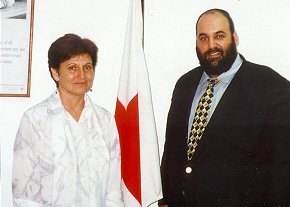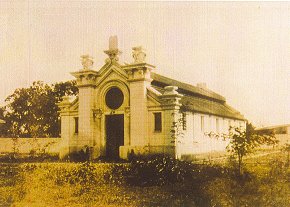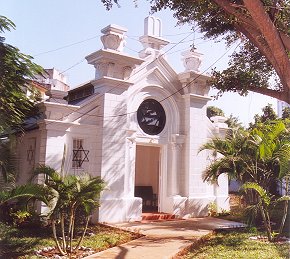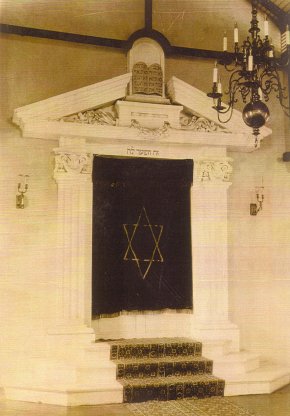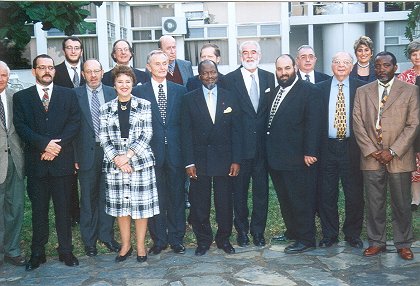|
AJC pledges Jewish aid for Moçambique June 2000
Delegates from Moçambique, South Africa, Botswana, Zimbabwe, Namibia
& Swaziland meet with
In the wake of the recent flood devastation in Mozambique, Mervyn Smith, chairman of the African Jewish Congress, pledged the support of Jews throughout the world to President Joaquim Chissano, while newly appointed Israeli Ambassador to six African states, Itzhak Gerberg, gave assurances of Israel’s ongoing aid to the country.
They were speaking during an official visit to President Chissano prior to the AJC conference held in Maputo.
In response to Smith’s explanation of the objectives of the AJC – which is part of the World Jewish Congress - and its vigilance regarding anti-Semitism throughout the world, Chissano said he viewed the State of Israel and the Jewish nation as different entities.
Although there had been a period of strained relations between Mozambique and Israel, good ties now existed between the two countries. “I have no problem with Israel.” Chissano said he had had minimal contact with the resident Jews, but he would continue the stance adopted by the late former president Samora Machel - “we will never permit anti-Semitism here”. There are currently only about 19 identified Jews living in Mozambique and efforts are being made, through the AJC, to reorganise this fragmented community.
On the aid, Chissano said: “Thank you for your concern - we are optimistic because we have this international aid,” he told the AJC delegation, which comprised representatives from South Africa, Botswana, Swaziland, Zimbabwe, Namibia and Mozambique.
Seventeen of the 40 delegates to the conference attended the meeting with the President. Chissano said Mosambique was now facing “the most important period of reconstruction” – controlling the consequences of the floods, which had resulted in deaths form malaria and cholera; relocating people to safer places on higher ground; rebuilding road and railway systems and distributing seeds and cattle form Zimbabwe and South Africa to those who had lost everything during the floods.
Apart from the deaths by drowning and disease caused by the water, the President explained the extent of the destruction to businesses and factories, electricity power stations, makeshift homes and even conventional buildings, the uprooting of farms and pollution of water in boreholes and wells.
“We have to reconstructs property damaged by floods and cyclones. We have met with donors, who are giving us what we asked for. However, negotiations to receive the money are a long process. “But I believe if we publicise the aid we are receiving (from around the world), others will come to the fore,” Chissano said.
Rabbi Moshe Silberhaft, spiritual leader of the AJC, presented the President with a shofar, mounted in a glass case, while South Africa’s Chief Rabbi Cyril Harris gave Chissano a copy of his recently published autobiography.
The AJC conference was be the second major Jewish influx into Mozambique this year, the first having taken place a few months earlier when many Jews were among the relief workers who were in the country as part of an international flood relief effort. The Maputo Synagogue was used as a drop-off point for supplies to be collected and sent to flood victims via the International Red Cross and Red Crescent Movement in Maputo.
Rabbi Moshe Silberhaft, spiritual leader of the AJC, represented the Mozambique Jewish community at the official handing over of materials donated for flood victims by Mozambique Jewry to Fernanda la-Sallette de V Teixeira, secretary general of the Red Cross in Mosambique.
Delegates to the AJC conference from South African Jewish Board of Deputies handed over money collected from world Jewish communities - particularly in the United Kingdom, Canada and New Zealand - to the Red Cross in Mozambique. The proceeds will be used to establish a water purification plant in one of the resettlement areas in Monjoaka.
Dr Alberto Laitta, national co-ordinator of sanitation and water purification for the Mozambique Red Cross, said the country was facing one of the most troubled situations in its history.
Expressing his appreciation for the aid, Laitta said his branch of the Red Cross, in association with Germany, was giving assistance “with whatever is needed. “We are trying to get safe water and safe sanitation to the people, to prevent cholera and control malaria - which is fortunately not yet an epidemic.”
He said, out of Mozambique’s total population of four and - a - h a l f million, 760 000 needed assistance. Some 700 people had died as a result of the floods. We will carry on with the help of people added.
It was - as African Jewish Congress chairman Mervyn Smith put it - “a feeling of being in touch with our Jewish past” - when 40 delegates to the recent AJC conference in Maputo joined a handful of local Jews (and gentiles) for a Friday evening service in the city’s picturesque, though structurally precarious, synagogue. “Don’t lean against anything,” warried AJC spiritual leader, Rabbi Moshe Silberhaft, before the singing of Lecha Dodi, “the beams might come crashing down!”
Outside, security guards, who escorted congregants on foot back to the Polana Hotel, kept watch, while inside a vigilant Rabbi Silberhaft discreetly ushered the local women to their section at the rear of the shul.South Africa’s Chief Rabbi Cyril Harris, who gave the drosha, followed in the footsteps of one of his predecessors the late Chief Rabbi Dr J L Landau, who officiated at the consecration of the synagogue on August 29, 1926.
But the once flourishing Congregacao Hebraica de Lourenco Marques (Hebrew Congregation of Lourenco Marques) was not always a place of worship. During Mozambique’s period of Marxist rule, when the attitude towards religion was distinctly hostile, the synagogue was taken over by the government. Not because it was nationalized, but because, abandoned and forgotten, it had become, inter alia, a brothel, a haven for drug addicts and criminals, a church and a storage center for spare parts for Red Cross vehicles.
It was through the efforts of a non-Jewish Mozambican businessman Alkis Macropulos - returned to the Jewish community. Macropylos, now the honorary consul for Cyprus in Maputo, also secured the handing back of the Jewish cemetery, which had become a garbage dump, with the ohel housing a vagrant.
To the applause of delegates to the AJC conference form South Africa, Botswana, Swaziland, Zimbabwe, Namibia and Mozambique, Macropulos related his story: “Having lived in Johannesburg among many Jews, who were my closest friends, it pained me to see what had become of the shul in Maputo. So, I took it upon myself to approach the Minister of Foreign Affairs and request that the government return the property to the Jewish people.
“Puzzled at my concern, they asked ‘Are you Jewish?’ and I simply said I was. It made things less complicated! “I was then referred to the Minister of Justice, who agreed to look into the matter. When I heard the good news - that I was to collect the keys and the shul would be officially handed over at a given time and place - I panicked because I was going away and thought I might not be back in Maputo in time. “But my Jewish friend, Judy Shane, who is attached to the US Embassy, agreed to stand in for me. She did - and we got the shul, and later the cemetery, back in Jewish hands.”
That was in 1989, coinciding with the start of the collapse of Communism in the former Soviet Union. Macropulos was dismayed to discover that the shul gates had been removed to allow access to Red Cross trucks. So he replaced them himself, modelling the new gates on the design of those from the Parkview-Greenside Hebrew Congregation, “which I drove past every day when I lived in Johannesburg”.
The year 1992 saw the restoration of the cemetery: the raising of walls, repair and re-erection of tombstones and the removal of rubbish from the property. More graves were discovered during the operation.
When the synagogue was returned, only four books were found on the premises, the oldest printed in a Russian script, dating back to the turn of the century.
In 1993 and 1994 regular services were held on Friday nights, the shofar was founded on Rosh Hashanah for the first time in 15 years and diplomatic relations between Israel and Mozambique were re-established.
On April 11, 1994, Chief Rabbi Harris brought a Sefer Torah, which he had personally acquired from the Schoonder Street Synagogue in Cape Town, to Maputo to be read in the shul on that day, which coincided with Rosh Chodesh. (The two Sifrei Torah from the Maputo Shul, which had been in safekeeping with the SA Jewish Board of Deputies, had been pronounced pasul.)
In August, 1996, Rabbi Silberhaft officiated at the 70th anniversary of the consecration of the synagogue. However, synagogue life over the past few years has been somewhat erratic. The arrival in Maputo of an American liberal Jew, saw traditional Orthodox practices discarded in favour of opening the shul to all denominations.
This led to the currently constituted shul committee of three non-Jews - Rogerio Levy Fonseco (the Honorary Consul for Israel), Celina Morais (the treasurer) and Etevaldo Hipolito de Jesus (who is in charge of the Jewish community’s cultural and humanitarian affairs).
Few of the 19 Jews living in Maputo attended services or take part in communal activities. But, with the appointment at the AJC conference of a Mozambican - born Jew, Victor Arnold, who was resident in South Africa for many years, as the official AJC representative for Mozambique,Congress leaders are hopingthe situation will change.
In fact, Dr Basil Samuels, a former Johannesburg dentist who set up a kitchen manufacturing business in Maputo three years ago, has fallen in love with his new country. “If you are tired of the crime and violence, make aliyah here,” he quipped to South African delegates.
His suggestion was quickly countered by the Israeli Ambassador to six African states, including Mozambique, Itzhak Gerberg, who told the AJC conference: “There is only one place to make aliyah – and that is Israel.” He then relayed a positive message to delegates from Eitan Ben Tzur, director of the Ministry of Foreign Affairs in Jerusalem. “We hope that the African states will achieve prosperity and stability and be our partners in meeting the challenges of the future,” he said, emphasizing the importance of strengthening crucial ties between Israel an the Jewish communities in Africa.
Representatives form other African states, who presented reports at the conference, were Russell Gaddin (South Africa), Harold Pupkenwitz (Namibia), Richard Lyons (Botswana), Maurice Ross and Dr Bernie Tatz (Zimbabwe) and Geoff Ramokgadi (Swaziland).
In his report on Zimbabwean Jewry, Ross stated that, in addition to the 766 Jews living mainly in Harare and Bulawayo, a further 60 Jews - mostly widowed or intermarried - had been discovered recently. “The prevailing sociopolitical/economic environment in the country is destabilsing the community and many are leaving, or contemplating leaving, in the near future.
“This will obviously throw an even greater burden (financial and spiritual) on those remaining, to keep a Jewish infrastructure going.” Pupkewitz reported that “Jews are encouraged by the President, Dr Sam Nujoma, to settle in Namibia, where we enjoy a peaceful environment, relatively free of crime compared with other African countries regionally and continentally.” There were about 50 Jewish individuals - 12 families - living mainlyin Windhoek. “We mostly mange to have a minyan for services on Friday evenings and children enjoycheder classes at the International School. “We believe enthusiasm and love for the Jewish way of life will keepus going,” he said. Pupkewitz added that there was no organised anti-Senitism in his country. “The few old Nazis and neo- Nazis meet clandestinely, but don’t represent any mentionable problem any more.”
Lyons reported a “great revival in religious activities” in Botswana, where some 30 affiliated and 40 unaffiliated Jews lived. There were no problems with minyanim for religious services, Hebrew was taught by an observant Israeli woman and there had been an increase in Jewish settlers in the country.
“The climate is favourable for business, we have a sound economy and the country is peaceful with a low crime rate,” he said.
Presenting the report on Swaziland - home to some 40 Jewish individuals, mainly Israelis on contracts - Ramokgadi, speaking as a black former South African, urged Jewish communities to interact with understanding and empathy towards black fellow citizens.“Pumping in money” did not win trust, he said. “Rather teach us what you know in terms of skills and expertise.” Swaziland’s Jewish community was respected by all citizens of the country. “There is an open line of communication and friendship with Muslims, the Bahai, Christians, Hindus and the Swazi nation at large. There is absolutely no sign of noticeable anti-Semitism or anti-Israel sentiment,” Ramokgadi said. |
